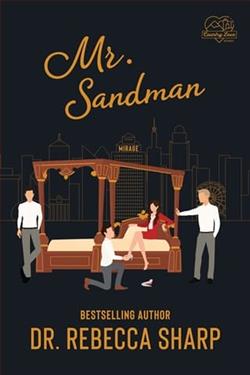Page 20 of The Surviving Sky
“It’ll reveal that nothing except them can survive an earthrage.”
“The trees survive,” Oam interrupted. “Clearly, all the plants of the jungle survive an earthrage, or there wouldn’t be a jungle.”
Iravan raised his eyebrow, studying the young man. Ahilya winced, embarrassed. She’d understood his expression, of course. Had this boy ever visited the jungle at all?
“Don’t look like that, Iravan,” Ahilya muttered, her voice low and pitched for his ears alone. “It’s Oam’s first time. I’m the only real archeologist Nakshar has, and you know as well as I do that no one cares about the jungle. Not when trajection and flying are the only truths we’ve known. None of our histories teach us about the jungle except to remark on how we escaped it.”
Iravan shook his head in disbelief and raised his voice. “Jungle plants don’t survive an earthrage. Nothing survives an earthrage. You’ve never seen its true devastation. Nakshar flies away before one truly erupts.”
He himself had only seen an earthrage when Kiana had unveiled the magnifiers to the council a few years earlier. Iravan still remembered his shock and awe as he had peered through the magnifier window to study the view below. He had always known—everyoneknew—howdevastating the earthrages could be. The storms were tremors and quakes of massive proportions. They were tornadoes that eroded deep layers of the very soil. Yet to see one, to actually see the earth roiling, gigantic clouds of dust ballooning, boulders and tree trunks ricocheting and crumbling, endlessly,violently…He had left the magnifier trembling, terror and humility throbbing in him in equal parts.
“The violence wipes everything out,” he said. “Jungle plants grow from seeds that are flung around every earthrage. The oldest tree you will see is only as old as when the last earthrage came to an end. You are about to walk into a jungle that is literally birthing itself in front of you.”
“That depends on the length and ferocity of the earthrage,” Ahilya muttered.
“Other animals,” Oam began at the same time, then stopped.
Iravannodded—atAhilya; she was right, if pedantic. But Oam’s knowledge of the world was appalling. He glanced at the boy and said, “You mean squirrels and birds and all those creatures we have in the ashram? You think those survived in the jungle?”
Ahilya winced once more, avoiding his gaze, but Iravan could read her mind perfectly.
Oamshouldhave known better. If he had paid more attention to her research and less to flirting, he would have already known this. Iravan was almost impressed with how easily she had ensnared the young man. Ahilya would have made a magnificent architect if she’d had the ability.
Her voice was gentle when she spoke. “There are no such creatures in the jungle, Oam. It’s only the yakshas and the jungle plants out there. Our species was land-dwelling once, and the jungle was our natural home, but a thousand years before, when earthrages grew in frequency and ferocity, the early architects took us to the skies along with any creatures that were lucky enough to be part of the first ashrams. The only remnants of jungle creatures now are the yakshas, and not all creatures evolved to become them.”
“Only the yakshas survive here,” Iravan said. “They might be dull, unable to sense us if we get close, but they’re tough. There’s no doubt their sheer sizes help their resilience. We can never hope to do what they do.”
But Ahilya turned to him, her eyes flashing.
“You don’t know that,” she said. “Even if the architect records are right, even if there isn’t any habitat down here for the yakshas,evenif their sizes are the answer behind theirsurvival—studyingthem will still give us information. It will give us clues for our own survival, if we ever need to return to the jungle.”
“We are refugees,” Iravan said flatly. “That is our history. Our identity. The jungle was our home, but it turned us away; it expelled us. That is why we fly. If the early architects had not discovered how to traject plants for flight, we’d be extinct like everything else. The architects found us a new home. They ensured the survival of our species. Returning to the jungle will never happen, not while there is sanctuary in the sky. Not while there are architects.”
Oam scowled but didn’t say anything. Ahilya stared at Iravan, her chin trembling. He stared back, a silent challenge in his gaze to refute his logic, but then, without warning, something within him stirred, breaking the seriousness of the moment. Iravan’s lips twitched. He felt an abrupt desire to take her in his arms, breathe her in, tell her how much he had missed her and their conversation. He didn’t want to fight anymore. He wanted tospoilher. The realization took him aback. Iravan blinked and looked away.
When the lily pad bobbed against the bank silently, it almost came as a surprise. The three stepped off. Above them, the wall of the briar dome glittered, thorns and spikes covering every inch.
Iravan stopped trajecting and tapped at one of his rudra beads. It was a similar one to the one he’d taken from Naila and crushed, except this one contained higher permissions granted only to Senior Architects. The key activated, and a subtle complex melody emerged, audible only to him.
For a moment, nothing happened.
Then the briar wall groaned. Wood unfurled, a painful sound like bones gnashing. The branches snapped one by one in agony. A doorway appeared in the wall, but the movement seemed forced.
Iravan frowned. His key was working but there was a strange resistance. It was as though the ashram didn’t want to let them out. He thought to speak a warning, but after his speech, such a caution would hardly reflect well on the architects. He couldn’t call the mission off, either; at best, they’d think him a coward, and at worst, an imperious bastard. He gestured silently to Ahilya, but she ignored him.
Her eyes were trained on the doorway. Her hands trembled.
“What’s wrong?” Iravan asked.
She toyed with the locket on her throat. It chimed softly. Underneath it he could see her pulse race.
“Is it the jungle?” he pressed. “We don’t have to go. It might not be a bad idea.”
“No. You won’t understand.”
“Try me.”
She didn’t bother to respond, fiddling with her locket.















